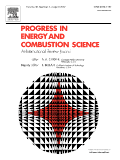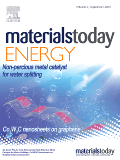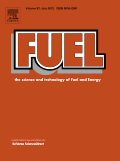
Energy Storage
Scope & Guideline
Unlocking the Future of Renewable Energy Solutions
Introduction
Aims and Scopes
- Energy Storage Materials:
Research on various materials used for energy storage, including batteries (lithium-ion, sodium-ion, etc.), supercapacitors, and phase change materials, with an emphasis on their electrochemical performance and structural properties. - Thermal Energy Storage Solutions:
Exploration of thermal energy storage systems, particularly those utilizing phase change materials and innovative heat transfer techniques, aimed at improving energy efficiency in various applications, including buildings and industrial processes. - Renewable Energy Integration:
Studies on the integration of energy storage technologies with renewable energy sources such as solar, wind, and hydro, focusing on optimizing energy management and enhancing grid stability. - Energy Management and Control Systems:
Development of advanced control strategies and algorithms for optimizing the performance of energy storage systems, particularly in hybrid configurations with electric vehicles and renewable energy systems. - Techno-Economic Assessments:
Economic analysis and feasibility studies of energy storage technologies, addressing cost reduction, sustainability, and environmental impacts, to inform policy and investment decisions.
Trending and Emerging
- Advanced Battery Technologies:
There is a growing focus on the development of next-generation batteries, including solid-state, sodium-ion, and magnesium-ion batteries, which promise higher energy densities and improved safety compared to conventional lithium-ion systems. - Hybrid Energy Storage Systems:
Research into hybrid systems that combine different storage technologies (e.g., batteries and supercapacitors) is on the rise, aimed at leveraging the strengths of each technology for enhanced performance and efficiency. - Sustainable and Eco-Friendly Materials:
An increasing trend towards the use of bio-based and environmentally friendly materials in energy storage applications, such as biocarbon and phase change materials derived from natural sources, is evident as sustainability becomes a priority in research. - Artificial Intelligence and Machine Learning Applications:
The application of AI and machine learning techniques for optimizing energy storage systems, including predictive modeling for battery management systems, is emerging as a significant research area. - Energy Storage for Decarbonization Efforts:
Research aimed at utilizing energy storage systems to support decarbonization initiatives and integrate with smart grid technologies, reflecting a broader commitment to addressing climate change and energy transition.
Declining or Waning
- Traditional Lead-Acid Battery Research:
Research related to lead-acid batteries has significantly reduced in favor of more advanced technologies like lithium-ion and sodium-ion batteries, reflecting a broader industry shift towards modern energy storage solutions. - Basic Energy Storage Principles:
Publications focusing solely on theoretical principles of energy storage without application or technological advancements have become less common, as researchers now prioritize practical applications and innovations. - Single-Application Focus:
Studies concentrating exclusively on a singular application of energy storage systems, such as only electric vehicles or only grid applications, have waned, giving way to more integrated approaches that consider multiple applications.
Similar Journals

Energy Material Advances
Catalyzing Global Collaboration in Energy ScienceEnergy Material Advances, published by the American Association for the Advancement of Science, stands at the forefront of energy research, showcasing groundbreaking studies in the realm of renewable energy, fuel technology, and materials science. With the journal's commitment to open access since 2020, it aims to democratize knowledge and foster innovation across a global community of researchers, professionals, and students. The journal boasts an impressive impact factor, placing it firmly within the Q1 category across multiple disciplines including Energy (miscellaneous), Fuel Technology, and Renewable Energy, Sustainability and the Environment, highlighting its significance in advancing scholarly discussions. In the latest Scopus rankings, Energy Material Advances ranks among the top 10% of journals in its field, affirming its role as a pivotal resource for current and emerging trends in energy materials. The journal is dedicated to facilitating collaborative efforts and inspiring novel approaches to the challenges posed by energy sustainability and technological advancement.

Journal of Energy Storage
Transforming the landscape of energy storage systems.Welcome to the Journal of Energy Storage, a premier publication dedicated to advancing the science and technology of energy storage systems. Published by ELSEVIER in the Netherlands, this esteemed journal boasts a significant impact in the field, categorized as Q1 in Electrical and Electronic Engineering, Energy Engineering and Power Technology, and Renewable Energy, Sustainability and the Environment for 2023. With a commitment to disseminating high-quality research, the journal provides a platform for the latest innovations and findings, covering a broad spectrum of topics from battery technologies to thermal energy storage. As a must-read for researchers, professionals, and students alike, the Journal of Energy Storage facilitates vital discussions that shape the future of sustainable energy practices. While presently offering select access options, the journal continues to expand its reach and influence within the academic community, encouraging submissions that drive forward our understanding of energy solutions. Discover the forefront of energy storage research and contribute to a world increasingly reliant on efficient energy management.

Journal of Power Technologies
Shaping the Future of Energy EngineeringJournal of Power Technologies is a prestigious academic journal dedicated to advancing the field of power engineering, specifically focusing on innovative technologies and methodologies related to energy production, transmission, and efficiency. Published by the renowned Warsaw University of Technology, Institute of Heat Engineering, this journal is committed to disseminating high-quality research that addresses the challenges and opportunities in the energy sector. Although currently not open access, the journal provides extensive subscription options for access to its comprehensive range of articles. With an emphasis on original research, case studies, and reviews, the Journal of Power Technologies serves as a vital resource for researchers, practitioners, and students alike, aiming to shape the future of sustainable power systems and contribute significantly to the global energy discourse. The journal continues to foster an academic environment where innovation in power technology is highlighted and celebrated, supporting the ongoing quest for sustainable energy solutions.

Advances in Energy Research
Pioneering Innovations in Energy Efficiency and Technology.Advances in Energy Research is a prominent journal dedicated to the exploration and advancement of energy technologies and sustainable practices. Published by TECHNO-PRESS, this journal serves as a vital platform for researchers, professionals, and students in the energy field, featuring innovative studies and reviews that contribute to the body of knowledge surrounding energy efficiency, renewable resources, and the integration of new technologies. The journal holds a significant position in energy research and aims to facilitate the dissemination of groundbreaking findings and ideas that are pivotal for the transition toward a more sustainable energy future. Located in South Korea, with an ISSN of 2287-6316, it embraces an open access philosophy that ensures widespread availability of its content, further enhancing its impact in the academic community.

Smart Energy
Transforming Energy Practices with Cutting-Edge InsightsSmart Energy, an esteemed publication by ELSEVIER, stands at the forefront of energy research, exploring innovative solutions and sustainability practices in the energy sector. With an impressive Open Access model since its inception in 2021, this journal has rapidly established itself as a vital resource for researchers and professionals alike, providing unrestricted access to high-quality peer-reviewed articles. Positioned in the Q1 category across multiple fields, including Energy Engineering and Power Technology, Renewable Energy, and Management, Monitoring, Policy and Law, Smart Energy demonstrates a strong commitment to advancing knowledge in the energy domain. Registered under the ISSN 2666-9552, it garners significant attention, ranking within the top ranges of Scopus metrics across various disciplines. The journal continuously aims to bridge the gap between academic research and practical application, making it an essential outlet for scholars and practitioners dedicated to fostering sustainable energy solutions worldwide. Located in the United Kingdom, Smart Energy is shaping the future of energy management from its publishing base in Amsterdam, the Netherlands.

PROGRESS IN ENERGY AND COMBUSTION SCIENCE
Illuminating the path to efficient energy technologies.PROGRESS IN ENERGY AND COMBUSTION SCIENCE, published by PERGAMON-ELSEVIER SCIENCE LTD, stands as a premier journal in the realms of energy engineering and fuel technology, with an impressive impact factor and recognition across multiple scientific disciplinary matrices. Since its inception in 1975 and continuing through 2024, this esteemed publication has contributed significantly to the advancement of knowledge in energy resources, combustion processes, and their applications in modern technology. With a robust ranking of Q1 in key categories such as Chemical Engineering, Energy Engineering and Power Technology, and Fuel Technology, the journal consistently showcases high-quality research that influences both academia and industry. Researchers, professionals, and students benefit from its rigorous peer-reviewed articles, which foster a deeper understanding of energy-related challenges and innovations. Although it is not an Open Access outlet, its relevance and contribution to the scientific community are undeniable, making it a vital resource for anyone engaged in the pursuit of sustainable energy solutions.

Materials Today Energy
Pioneering Research at the Intersection of Materials and EnergyMaterials Today Energy is a premier journal published by Elsevier, focusing on the interdisciplinary field of energy materials. With an ISSN of 2468-6069, the journal is renowned for its impactful research as evidenced by its impressive Q1 quartile rankings in multiple categories including Energy Engineering and Power Technology, Fuel Technology, and Renewable Energy. It stands out with strong Scopus rankings, highlighting its significance in the respective research communities, such as being ranked 3rd in Nuclear Energy and Engineering. Established from 2016 to 2024, the journal aims to provide a platform for innovative research that addresses the global demands for sustainable energy solutions. Although it is not open access, Materials Today Energy is accessible to a broad audience, encouraging collaborations among researchers, professionals, and students in the pursuit of advancing materials science and energy technologies. This makes it an essential resource for those looking to remain at the forefront of discoveries that shape the future of energy.

Fuel
Charting New Frontiers in Fuel TechnologyFuel is a premier international journal published by Elsevier Science Ltd, showcasing critical advancements and insights in the fields of chemical engineering, energy engineering, power technology, and organic chemistry. With a significant history dating back to 1922 and continuous publication from 1970 to 2025, Fuel holds an impressive position in the academic community, reflected in its top-tier rankings—Q1 in multiple categories including Fuel Technology and Chemical Engineering for the year 2023. This journal is dedicated to exploring innovative research and application of fuel technologies, driving forward the dialogue on sustainable energy solutions. Researchers and professionals alike will find Fuel to be an essential resource, providing access to high-impact articles that contribute to advancements in methodologies and applications, while navigating the complexities of global energy challenges.

INTERNATIONAL JOURNAL OF ENERGY RESEARCH
Empowering innovation in energy research and technology.INTERNATIONAL JOURNAL OF ENERGY RESEARCH (ISSN: 0363-907X; E-ISSN: 1099-114X), published by Wiley-Hindawi, stands at the forefront of energy research, offering a scholarly platform pivotal for advancing knowledge in the fields of energy engineering, nuclear energy, fuel technology, and renewable energy systems. With an impressive Q1 and Q2 ranking across several categories as of 2023, this journal reflects a commitment to high-quality, peer-reviewed research that addresses both theoretical and practical challenges in the energy sector. Now an Open Access journal since 2023, it enhances accessibility and dissemination of cutting-edge research to a global audience. Located in the United Kingdom, with an active publication history dating back to 1977, the journal aims to contribute to sustainable energy solutions and innovative technologies. Researchers, professionals, and scholars will find valuable insights and discussions here, bridging gaps in energy research and policy-making.

Joule
Igniting Innovation in Energy ResearchJoule, published by CELL PRESS, is a premier journal dedicated to the rapidly evolving field of energy research. Since its inception in 2017, Joule has established itself as a leading source of high-impact studies in energy, achieving an outstanding Q1 ranking in the Energy (miscellaneous) category and ranking #1 out of 73 in the general energy field, placing it within the 99th percentile according to Scopus metrics. The journal aims to advance the understanding of diverse energy forms and their applications, providing a platform for significant breakthroughs that can drive sustainable practices and innovative technologies. Through rigorous peer review and expert contributions, Joule serves as an invaluable resource for researchers, professionals, and students engaged in tackling some of the most pressing energy challenges of our time. Based in the United States, Joule continues to foster collaboration and interdisciplinary approaches in energy research, striving to illuminate pathways toward a sustainable future.